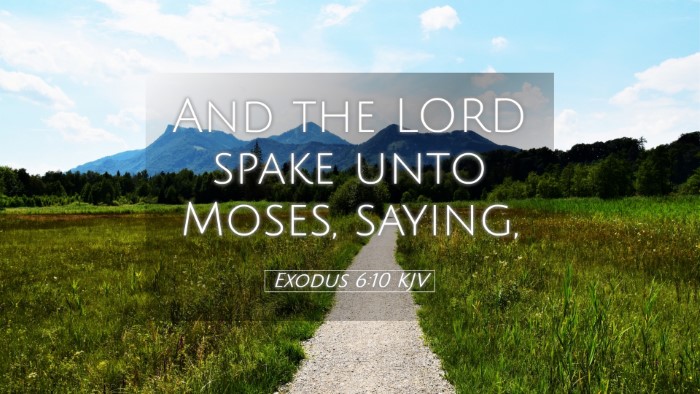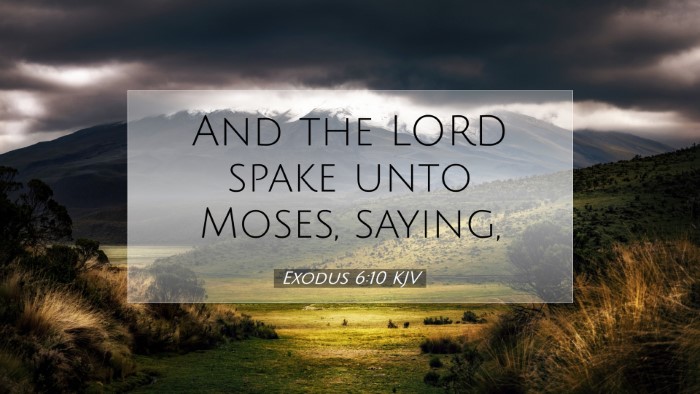Exodus 6:10 Commentary
Bible Verse: "And the LORD spake unto Moses, saying," (Exodus 6:10, KJV)
Introduction
The passage in Exodus 6:10 marks a crucial juncture in the narrative of Israel's deliverance from slavery in Egypt. This verse serves as a divine directive from God to Moses, emphasizing both God's authority and the urgency of the mission entrusted to Moses. In understanding this verse, we draw from various public domain commentaries that provide rich theological insights and contextual analysis.
Contextual Background
- Moses' Mission: Moses had been called to lead the Israelites out of Egyptian bondage. However, he faced tremendous opposition and doubt, particularly from both the Israelites and Pharaoh.
- God's Covenant: This period is a fulfillment of God's covenant with Abraham, Isaac, and Jacob, showcasing God’s steadfastness in redeeming His people.
- Israel’s Suffering: The Israelites were suffering under harsh oppression, which makes the reassurance from God through Moses significant, as it highlights God's awareness and response to their plight.
Theological Insights
The following insights from noted commentators elaborate on the depth of Exodus 6:10:
Matthew Henry
Henry emphasizes the authoritative nature of God's communication with Moses. He notes that God speaks “unto” Moses, indicating a personal and direct relationship. This divine address is not merely informational but instructive, implying that Moses is to act on behalf of the Israelites with confidence. Henry underlines the importance of obedience to God’s command as a key aspect of Moses’ leadership in the deliverance narrative.
Albert Barnes
Barnes provides clarity on the significance of God initiating this conversation with Moses. He indicates that it is a reminder that God remains actively engaged in the affairs of His people despite the current circumstances. Barnes also observes that Moses’ feelings of inadequacy are met with God’s reassurances, teaching the lesson that God's calling often comes with divine empowerment for the task ahead. This juxtaposition lays the groundwork for understanding how divine action typically complements human initiative.
Adam Clarke
Clarke remarks on the perseverance of Moses in the face of adversity and discouragement. He underscores that God's command to speak effectively illustrates the continued mission of Moses, despite opposition. Clarke highlights how, in moments of despair, God’s voice serves as a powerful motivator. This reinforces the theme that God’s directives often become sources of strength during times of weakness.
Practical Applications
- God’s Authority: Just as God spoke to Moses, He continues to communicate with us today through His Word. Pastors and theologians should stress the importance of recognizing and responding to God’s voice in our lives.
- Moses' Leadership: Moses’ journey encourages spiritual leaders to embrace their God-given tasks with confidence, despite external pressures and internal doubts.
- Community Hope: This verse serves as a reminder of God’s commitment to His people. It calls on believers to support one another, particularly those who may be experiencing periods of suffering or discouragement.
Conclusion
Exodus 6:10 is a testament to the unshakeable covenantal relationship between God and Israel, manifesting in a clear directive to Moses. Through the lens of various commentators, we gain insight into the themes of divine communication, authority, and the essential nature of obedience in fulfilling God’s mission. As we navigate our own challenges, may we draw strength from this passage, embodying the courage to respond to God's call with faith and diligence.


